Before we go through the article, let us first define what a hormone is. For those of you who are not familiar, hormones are commonly called “chemical messengers.” These are chemicals created by cells within the endocrine glands that are released into the bloodstream to send messages to other parts of the body. The entire endocrine system works together to control the level of hormones circulating in or bodies. Hormones affect many physiological activities, such as growth, metabolism, appetite, puberty, and even fertility. There are certain types of hormones that you may already be familiar with: Men and women can be affected by imbalances in hormones such as insulin, steroids, growth hormones, and adrenaline. Women may experience an imbalance in estrogen and progesterone, while men are likely to experience irregularity in testosterone.
Since they can affect your overall well-being, it is vital to make sure that you keep your hormones balanced. In this article, we will discuss the causes, signs, and symptoms of hormonal imbalance, some of the ways to balance our hormones naturally, available hormone tests, and other conventional treatments.
What causes the hormonal imbalance?
Hormonal imbalances occur when there are too little or too many hormones in the bloodstream. It is only natural to experience periods of hormonal fluctuations at certain points in our lives, but hormonal imbalances can also occur when the endocrine glands are not functioning correctly.
Hormonal imbalances may be caused by a combination of factors such as diet, medical history, genetics, stress levels, and exposure to toxins from your environment. Some of the causes may include chronic or extreme stress, lack of sleep and rest, obesity, gut issues, poor diet, sedentary lifestyle, genetic susceptibility, severe allergic reactions or infections, adrenal dysfunction, naturally-occurring plant estrogens found in soy products, and exposure to toxins, pollutants, and endocrine-disrupting chemicals, including pesticides and herbicides.
What are the signs and symptoms of hormonal imbalance?
Generally, the common signs and symptoms of hormonal imbalance are irregular menstruation cycles for women, infertility, depression and anxiety, fatigue, insomnia, low libido, unexplained weight gain or weight loss, changes in appetite digestive issues, and hair loss or hair thinning. Specific indications of hormonal imbalances may vary depending on what type of illness it may cause. Further examples are detailed below:
- Estrogen Dominance: Changes in weight, appetite, sleeping patterns; higher perceived stress and slowed metabolism
- Low estrogen: Low sexual drive, reproductive problems, menstrual irregularity, mood swings
- Hypothyroidism: Changes in metabolism, weight gain, fatigue, anxiety, irritability, digestive issues, irregular periods
- Low Testosterone: Erectile dysfunction, weight gain, muscle loss, fatigue, mood swings
- Diabetes: Weight gain, vision loss, fatigue, troubled breathing, dry mouth, skin problems
- Adrenal Fatigue: Muscle aches and pains, anxiety and depression, troubled sleeping, reproductive problems
How can I keep my hormones balanced?
Choose Healthy Fats
Your body needs various types of fats to produce hormones. They also keep your inflammation levels low, boost your metabolism, and promote weight loss.
You may want to include the following in your diet to keep your hormones in check: coconut oil, avocados, organically produced butter, and salmon. Salmon is the best source of omega-3 fatty acids, which are known to lower inflammation and help with other cognitive functions. As a rule, you need to avoid oils high in omega-6 fats (sunflower, corn oil, soybean, and peanut) and instead load up on natural omega-3s
Tackle Emotional Imbalances
Human emotions may have a direct impact on one’s health. A major component of balancing hormones naturally is tackling any emotional imbalances that you are dealing with head-on. You can do this by reducing stress levels, engaging in personal reflection, and taking time for yourself. Practicing meditation, deep breathing exercises, spending time outdoors, and exercising every day is beneficial.
Take supplements as needed.
It may be necessary to supplement to fill nutritional voids that can lead to hormonal imbalance. Vitamin D and probiotics are some of the known supplements that may be recommended by your physician.
Vitamin D: Vitamin D almost keeps inflammation levels low.
Probiotics: Probiotics are healthy bacteria that can aid in repairing your gut lining that, in turn, can balance your hormones. It can also improve the production and regulation of critical hormones like insulin and leptin.
Be aware of medication side effects.
Side effects of some medications and birth control can disrupt hormonal balance. Some side effects may include fatigue, appetite changes, altered sleeping patterns, low libido, and sometimes even depression. Some medications that can cause hormonal imbalance include dopamine agonists, corticosteroids, stimulants, glucocorticoids, and statins. It is essential to talk to your doctor about the side effects of the medications you are taking.
Get enough sleep
Lack of sleep may result in lots of health complications. Getting enough sleep does not only keep your stress hormones balanced, but it also allows the body to recover properly. Lack of sleep and excessive stress are linked to higher levels of cortisol, damages the immune system, low productivity, weight gain, and higher susceptibility to anxiety.
Get tested
If there is one way to figure out for sure where your hormonal levels are currently at, get tested. Various tests can detect hormonal imbalance. You need to fully disclose your symptoms in order to get accurate results.
Saliva testing
Saliva tests can measure hormone levels at the cellular level. A saliva test can measure your estrogen, progesterone, testosterone, cortisol, and DHEA levels.
Urine testing
A urine hormone test requires collecting urine samples for a 24-hour period. The urine is then tested to identify each hormone and the levels they are at on that day.
Hormone Blood testing
This type of hormone tests require blood samples to be collected at a laboratory and then measured for hormone levels. A blood test can measure free (or active) and total hormone levels, which saliva and urine testing cannot do.
Follicle-stimulating hormone testing
The FSH test is commonly used to measure the hormonal status of premenopausal women who are beginning to experience symptoms of menopause
Keeping your hormones in balance may be the key to avoiding health complications. Though there are natural ways to keep your hormones in check, getting yourself checked and tested is still the best and most accurate way to tell if you are doing an excellent job in making sure you are doing well. When in doubt, get tested. Your hormone test result is the map that can lead you to the right treatment.
Want to learn more? Check out our hormone tests for women or hormone tests for men.

